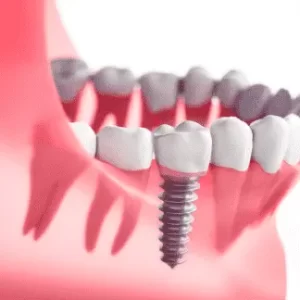Getting dental implants is a big step toward a stronger, healthier smile. But their success depends on how well you take care of them. Learning how to take care of your dental implants helps prevent complications and keeps them in top shape for years. A good routine protects not just the implants but also your overall oral health.
Unlike natural teeth, implants require a slightly different approach to maintenance. The right cleaning techniques, regular dental visits, and avoiding certain habits all contribute to their longevity. Taking the time to follow proper care methods can prevent infections and costly repairs later.
Why Dental Implant Care Matters
1. Prevents Complications
Dental implants are strong, but they are not immune to problems. Poor care can lead to infections like peri-implantitis, which affects the gums and bone around the implant. Left untreated, this condition may cause implant failure. A consistent oral hygiene routine helps prevent these risks.
2. Maintains Gum and Oral Health
The health of your gums directly affects the stability of your implants. Bacteria buildup around the implant can lead to inflammation and other oral health issues. Keeping your gums healthy ensures a strong foundation for your implants.
3. Protects Your Investment
Dental implants are a long-term investment. They replace missing teeth, improve chewing ability, and enhance your smile. Proper care helps them last for decades, avoiding the need for replacements or repairs.
Good oral hygiene is the foundation of implant care. Establishing the right habits from the beginning ensures they remain in the best condition. The next step is learning the right cleaning methods and lifestyle choices to keep them functioning properly.
How to Take Care of Your Dental Implants
Keeping your dental implants clean and free from bacteria is key to their longevity. While they are not susceptible to cavities like natural teeth, the surrounding gum tissue and bone need protection. A few simple habits can make a big difference in maintaining their health.
1. Follow a Proper Daily Cleaning Routine
Just like natural teeth, implants need daily cleaning to remove plaque and food particles.
- Use a soft-bristle toothbrush – Hard bristles can scratch the surface of the implant and irritate the gums.
- Choose non-abrasive toothpaste – Avoid toothpaste with harsh ingredients like baking soda or charcoal, which can wear down the implant surface.
- Brush gently and thoroughly – Clean around the implant and gumline without applying too much pressure.
2. Floss and Rinse Regularly
Flossing removes plaque between teeth and around the implant, preventing gum disease.
- Use implant-friendly floss or interdental brushes – Traditional floss may not be the best option, so consider unwaxed floss or special implant floss.
- Try an oral irrigator (water flosser) – Water flossers help clean hard-to-reach areas around the implant.
- Rinse with an alcohol-free mouthwash – Alcohol-based rinses can dry out the mouth, increasing the risk of bacteria buildup.
3. Avoid Harmful Habits
Certain habits can weaken or damage your dental implants over time.
- Quit smoking – Smoking slows down healing and increases the risk of implant failure.
- Limit alcohol consumption – Excessive alcohol can weaken the bone structure supporting the implant.
- Avoid biting hard objects – Ice, hard candy, and even using your teeth to open packages can damage the implant.
4. Visit Your Dentist Regularly
Routine checkups allow your dentist to monitor the health of your implants and address any early signs of trouble.
- Get professional cleanings every six months – Specialized dental tools safely remove plaque and tartar without harming the implant.
- Ask about implant-specific care tips – Your dentist can recommend the right products and techniques based on your needs.
By following these steps, you can ensure your implants stay secure and functional for years. Keeping up with proper hygiene and avoiding damaging habits are the most effective ways to protect your investment.
Common Mistakes to Avoid in Dental Implant Care
Even with the right habits, some mistakes can put your dental implants at risk. Avoiding these common issues helps maintain their strength and longevity.
1. Using the Wrong Toothbrush or Toothpaste
Not all dental products are safe for implants.
- Hard-bristle toothbrushes can scratch the implant surface. Stick to soft-bristle brushes for gentle cleaning.
- Abrasive toothpaste wears down the implant. Avoid toothpaste with baking soda, charcoal, or other harsh ingredients.
2. Skipping Flossing or Using Improper Floss
Flossing around implants is just as important as brushing. Plaque buildup can lead to infections and gum disease.
- Traditional floss can be too harsh. Use implant-friendly floss or an interdental brush to clean around the implant.
- Water flossers are a great alternative. They help remove plaque without irritating the gums.
3. Ignoring Early Signs of Gum Issues
Healthy gums are crucial for implant success. Any signs of irritation should not be ignored.
- Red, swollen, or bleeding gums may indicate infection. Early treatment can prevent more serious issues.
- Persistent bad breath could mean bacteria buildup. A proper cleaning routine helps eliminate this problem.
4. Neglecting Dental Checkups
Skipping regular visits to the dentist increases the risk of complications.
- Dentists can detect early signs of implant issues. Regular checkups allow for professional cleaning and monitoring.
- Minor problems can turn into major ones. Catching issues early prevents costly repairs or implant failure.
Avoiding these mistakes helps keep your dental implants in the best condition. Proper care ensures they remain strong, functional, and problem-free for years.
Signs Your Dental Implants Need Attention
Dental implants are designed to be durable, but complications can arise if they are not properly maintained. Recognizing early warning signs allows you to take action before problems become severe. If you notice any of the following issues, schedule a dental appointment as soon as possible.
1. Pain or Discomfort
Mild discomfort after getting implants is normal, but ongoing or sudden pain is not.
- Persistent soreness may indicate an infection or implant instability.
- Pain when biting or chewing could signal a problem with the implant’s placement or bone support.
2. Red, Swollen, or Bleeding Gums
Healthy gums are essential for implant success. If you notice any of these symptoms, it could be a sign of gum disease or infection.
- Swelling or redness around the implant area may indicate peri-implantitis.
- Gums that bleed easily, especially when brushing or flossing, need professional evaluation.
3. Loose or Shifting Implant
A properly placed implant should feel just like a natural tooth—firm and secure. Any movement is a serious concern.
- An implant that feels wobbly or out of place could mean bone loss or implant failure.
- Even minor shifting should be addressed immediately to prevent further damage.
4. Persistent Bad Breath or Unpleasant Taste
A lingering bad taste or odor in your mouth could mean bacteria buildup around the implant.
- This may be caused by trapped food particles, plaque, or infection.
- Regular brushing, flossing, and professional cleanings help prevent this issue.
If any of these signs appear, it’s important to seek dental care promptly. Early treatment can prevent more serious complications and keep your dental implants in excellent condition.
FAQs About How to Take Care of Your Dental Implants
Patients often have questions about maintaining their dental implants. Here are some common concerns and expert answers to help you keep them in top condition.
1. How often should I brush my dental implants?
You should brush at least twice a day, just like with natural teeth. Use a soft-bristle toothbrush and non-abrasive toothpaste to avoid damaging the implant surface.
2. Can I use regular mouthwash with dental implants?
It’s best to use an alcohol-free mouthwash. Alcohol-based rinses can dry out the mouth and irritate the gums, increasing the risk of infection.
3. Are electric toothbrushes safe for implants?
Yes, as long as they have soft bristles. Electric toothbrushes can be effective in removing plaque without putting too much pressure on the implant.
4. What foods should I avoid to protect my implants?
- Hard foods like ice, hard candy, and nuts can damage the implant crown.
- Sticky foods, such as caramel or gum, can get trapped around the implant and make cleaning difficult.
- Excessive coffee, tea, or red wine can cause staining over time.
5. Do I still need dental checkups if I take good care of my implants?
Yes, regular checkups are essential. Your dentist will monitor the health of your gums and ensure the implant remains stable. Professional cleanings help remove plaque buildup that daily brushing might miss.
Knowing how to take care of your dental implants properly ensures they remain strong and healthy. By following good hygiene habits and avoiding harmful practices, you can enjoy a lasting, confident smile.
Conclusion
Taking care of your dental implants is essential for keeping them strong and functional for years. A consistent oral hygiene routine, regular dental checkups, and avoiding harmful habits all contribute to their long-term success.
Learning how to take care of your dental implants doesn’t have to be complicated. Simple steps like brushing with a soft-bristle toothbrush, using implant-friendly floss, and steering clear of damaging foods can make a big difference. Paying attention to any signs of discomfort, swelling, or bad breath also helps prevent complications before they become serious.
By following these care tips, you can protect your investment and maintain a healthy smile. If you ever notice any issues with your implants, don’t wait—schedule a visit with your dentist to ensure everything stays in top condition.
Protect Your Smile with Expert Dental Care
Your dental implants deserve the best care to keep them strong and functional for years. At Advanced Emerald Dentistry, we provide expert guidance and personalized dental services to help you maintain a healthy, confident smile. From professional cleanings to comprehensive oral health checkups, our team ensures your implants and natural teeth stay in top condition.
Our highly trained dentists offer a full range of services, including preventive, restorative, and cosmetic dentistry. Whether you need routine maintenance or advanced care, we are committed to delivering the highest quality treatment in a comfortable setting.
Take the next step in protecting your smile. Contact Advanced Emerald Dentistry today to schedule your appointment.



